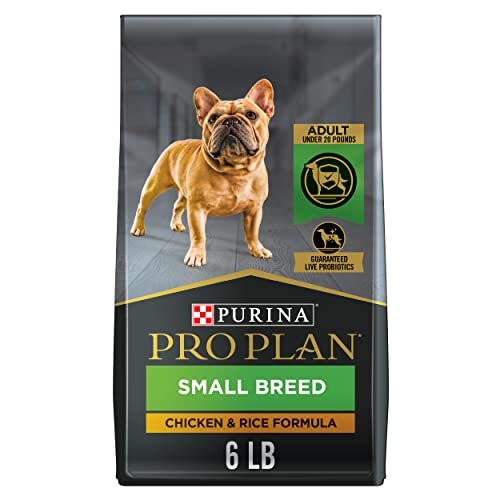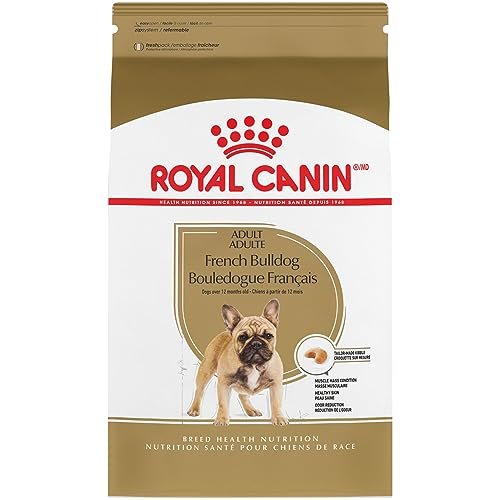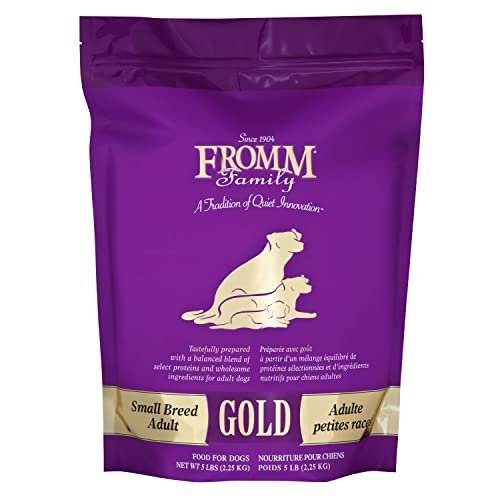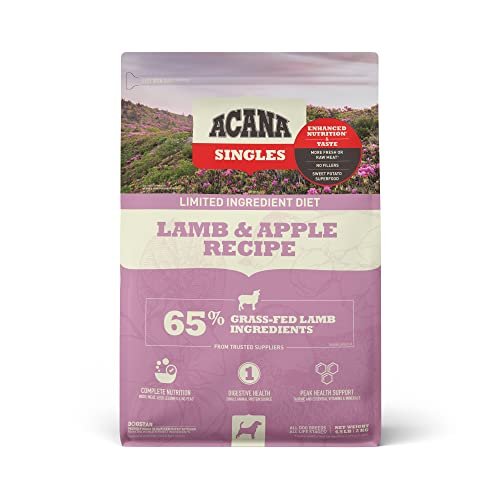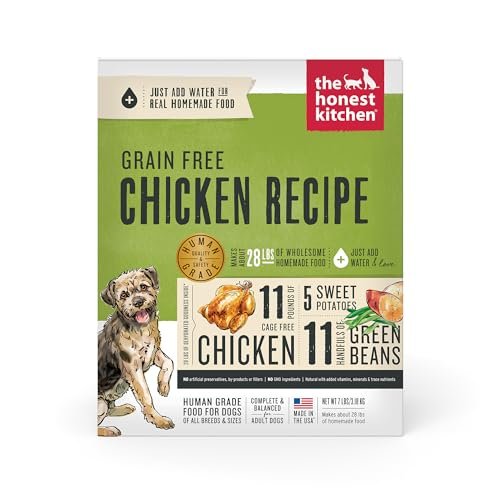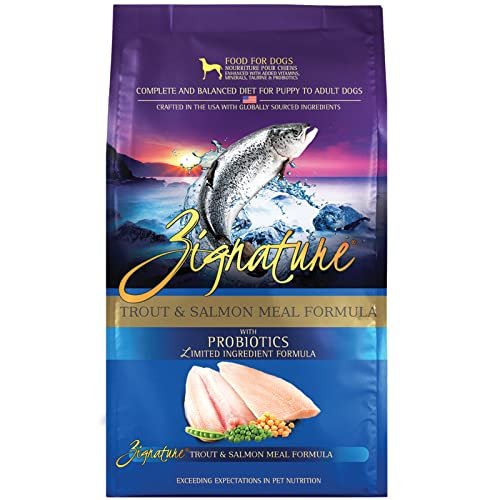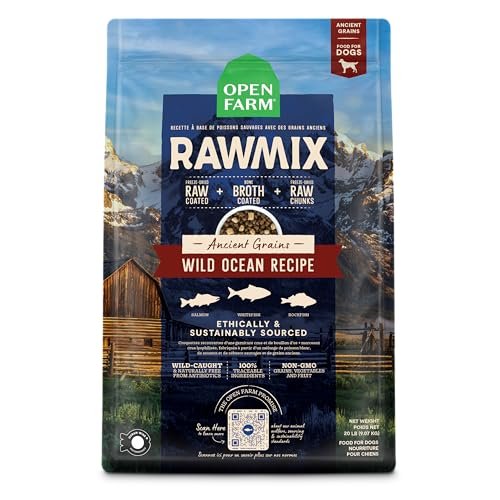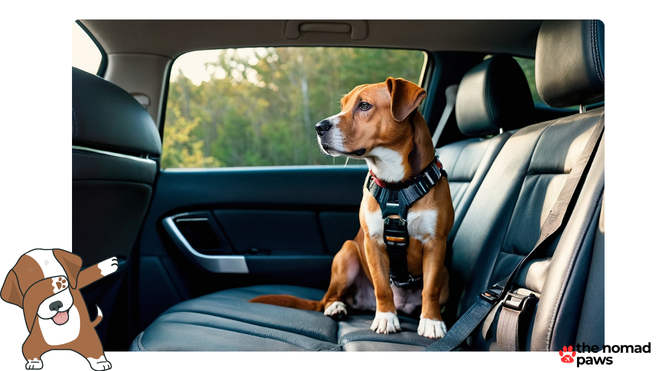French Bulldogs, with their charming personalities and adorable flat faces, have captured the hearts of dog lovers worldwide.
But when it comes to keeping these lovable pups healthy and happy, choosing the right food is crucial.
In this guide, we’ll explore the best food options for French Bulldogs, creating a plan rooted into their unique nutritional needs and offering expert advice to help you make informed decisions about your Frenchie’s diet.
Before we dive in, it’s worth noting that the Nomad Paws team consulted with 7 professional canine nutritionists to gather their expert opinions on the best food products for French Bulldogs.
Their insights, combined with extensive research and real-world feedback from Frenchie owners, have shaped the recommendations in this guide.
Understanding the Nutritional Needs of French Bulldogs
French Bulldogs, like all dog breeds, have specific dietary requirements that need to be met for optimal health.
Vet’s Tip: When selecting a food for your French Bulldog, remember to consider their unique body structure and metabolism.
Look for foods with high-quality protein sources, moderate fat content, and complex carbohydrates to support their overall health
Before we discuss the different dog food brands that make great products for Frenchies, let’s break down the key aspects of their nutritional needs to better understand what makes a food “best” for these adorable pups.
Unique Dietary and Food Requirements

Their compact, muscular build and brachycephalic (flat-faced) features mean they require a carefully balanced diet to maintain a healthy weight and support their respiratory system.
Protein is essential for Frenchies, as much as it is in the Maltese dogs diet, as it helps maintain their muscle mass and supports overall body function.
When shopping for your Frenchie’s food, look for foods with high-quality protein sources like chicken, beef, or fish as the first ingredient. Aim for a protein content of around 18-26% for adult French Bulldogs and 22-28% for puppies.
Fat is another crucial component of a French Bulldog’s diet. It provides energy and helps with nutrient absorption. However, due to their propensity for weight gain, it’s important to monitor fat intake carefully.
A fat content of 12-16% for adults and 14-18% for puppies is generally recommended.
Caloric Intake Considerations
French Bulldogs are known for their hearty appetites, but they’re also prone to obesity. This makes calorie control a critical aspect of their diet.
The average adult French Bulldog typically needs between 400-600 calories per day, depending on their age, activity level, and overall health status.
Our Nutritionists Say: Be cautious of overfeeding your French Bulldog, as they can easily become obese.
Monitor their weight and adjust their caloric intake accordingly.
A general rule of thumb is to provide 400-600 calories per day for adult French Bulldogs, depending on their age, activity level, and health status.
It’s important to note that these are general guidelines, and your Frenchie’s specific caloric needs may vary.
Factors such as age, weight, activity level, and health conditions all play a role in determining the ideal calorie intake. Always consult with your veterinarian to determine the best caloric intake for your individual French Bulldog.
For those with multiple dog breeds, it’s worth noting that different breeds have unique dietary needs.
For example, finding the best dog food for Dachshunds involves considering their particular energy levels and potential back issues, while Maltipoo dog food must cater to their small size and delicate digestive systems.
Understanding these differences helps ensure each pet gets the nutrition they need.
Macronutrient Balance

Achieving the right balance of macronutrients – proteins, fats, and carbohydrates – is key to ensuring your French Bulldog gets all the necessary nutrients without overloading on calories.
While protein and fat are crucial, carbohydrates also play a role in your Frenchie’s diet.
Complex carbohydrates provide energy and fiber, which aids in digestion. However, French Bulldogs don’t require a high-carb diet. Look for foods with moderate carbohydrate content from easily digestible sources like sweet potatoes or brown rice.
Remember, every French Bulldog is unique, and what works for one may not work for another.
My advice? Spend two minutes talking to your veterinarian when you make decisions about your dog’s diet, especially if your French bulldog on an airplane or traveling frequently, as this can affect their nutritional needs.
Best Dog Food for French Bulldogs: Our Picks
Now that we understand the nutritional needs of French Bulldogs, let’s explore some of the top pet food options available.
Vet’s Tip: When introducing new foods to your French Bulldog’s diet, do it gradually to prevent digestive upset.
Start by mixing a small amount of the new food with their current diet and gradually increase the proportion over 7-10 days.
These selections have been carefully chosen based on their nutritional profiles, quality of ingredients, and positive feedback from French Bulldog owners and veterinarians.
Purina Pro Plan High Protein Small Breed
Purina Pro Plan is a well-respected brand that offers a range of formulas suitable for French Bulldogs. Their Focus line, in particular, is often recommended by veterinarians for brachycephalic breeds like Frenchies.
This food is formulated with high-quality protein sources and includes glucosamine for joint health, which is important for French Bulldogs as they can be prone to joint issues.
The kibble size is also appropriate for a French Bulldog’s mouth, making it easier for them to eat and reducing the risk of choking.
Royal Canin offers a breed-specific formula designed exclusively for French Bulldogs.
This dry dog food is tailored to meet the unique nutritional needs of Frenchies, taking into account their body type, potential health issues, and even the shape of their jaw.
The kibble is specially designed to be easy for French Bulldogs to pick up and chew, encouraging slower eating which can help reduce gas and bloating.
The formula also includes nutrients to support skin health and maintain a shiny coat, addressing common issues in the breed.
Fromm Gold Adult Dog Food Small Breed
Fromm is a family-owned company known for its high-quality, nutrient-rich dog foods.
Their Gold line offers several options that are well-suited to French Bulldogs. The food is made with premium ingredients including real meat, fish, and poultry.
One of the standout features of Fromm’s food is its inclusion of probiotics, which can aid in digestion – a significant benefit for French Bulldogs who often struggle with digestive issues.
The balanced protein and fat content also make it a good choice for maintaining a healthy weight.
Fromm Gold Adult Dog Food Small Breed
Orijen is known for its biologically appropriate diets, meaning their foods are designed to mimic what dogs would eat in the wild. For French Bulldogs, their Six Fish or Regional Red formulas can be excellent choices.
These foods are high in protein from quality animal sources, with minimal carbohydrates. This aligns well with a French Bulldog’s nutritional needs.
The inclusion of fresh, raw, or dehydrated animal ingredients provides a nutrient-rich diet that can support overall health and vitality.
Like Orijen, Acana is produced by Champion Petfoods and follows a similar philosophy of biologically appropriate nutrition.
Their Singles line can be particularly good for French Bulldogs, especially those with food sensitivities.
These limited ingredient diets feature a single animal protein source paired with easily digestible carbohydrates. This can make it easier to identify and eliminate problem ingredients if your Frenchie has food allergies.
The high protein content and quality ingredients make Acana a premium choice for French Bulldog nutrition.
The Honest Kitchen Dehydrated Grain Free Chicken Dog Food
The Honest Kitchen offers dehydrated dog food that’s made with human-grade ingredients. This can be an excellent option for French Bulldogs, especially those with sensitive stomachs or food allergies.
The food is minimally processed, preserving more nutrients than traditional kibble.
It’s also highly digestible, which can be beneficial for French Bulldogs who often struggle with digestive issues.
The Honest Kitchen’s foods are free from by-products, preservatives, and artificial additives, making them a clean, wholesome choice for your Frenchie.
Zignature Trout & Salmon Limited Ingredient Formula
Zignature is known for its limited ingredient formulas, which can be beneficial for French Bulldogs with food sensitivities or allergies. Their foods are grain-free and use novel protein sources like kangaroo, guinea fowl, or goat.
These unique protein sources can be helpful if your French Bulldog has developed allergies to more common proteins like chicken or beef.
Zignature’s foods are also rich in essential fatty acids, which can help support skin and coat health – a common concern for many French Bulldog owners.
Open Farm RawMix Ancient Grains Wild-Ocean Recipe
$80.00 in stock
Open Farm Raw Mix offers a unique blend of high-protein kibble and freeze-dried raw meat. This combination can provide the convenience of kibble with the nutritional benefits of raw food, making it an interesting option for French Bulldogs.
The freeze-dried raw pieces are made from humanely raised meats and are rich in nutrients. The kibble is grain-free and made with premium ingredients.
This food can be a good way to introduce some of the benefits of a raw diet without fully committing to raw feeding, which can be challenging for some pet owners.
The Farmer’s Dog
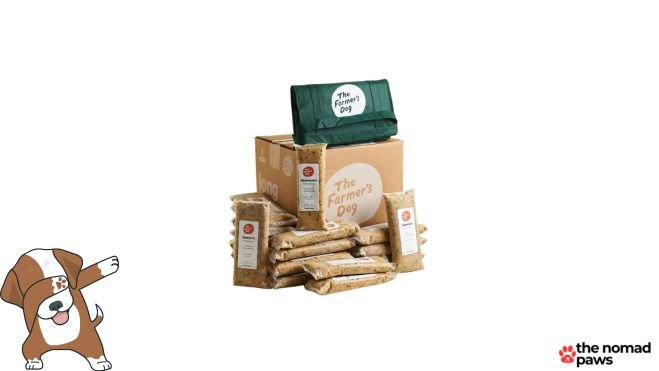
The Farmer’s Dog offers fresh, human-grade dog food that’s specially tailored to your French Bulldog’s unique needs. This brand stands out for its use of high-quality, whole food ingredients and its commitment to personalized nutrition.
Each meal is pre-portioned based on your Frenchie’s age, weight, and activity level, making it easy to maintain a healthy weight.
The food is gently cooked at low temperatures to preserve nutrients, and it’s free from preservatives and fillers.
Many French Bulldog owners report improvements in their dogs’ digestion, energy levels, and coat quality after switching to The Farmer’s Dog.
Ingredients to Avoid in a Healthy Diet for a French Bulldog
When choosing the best food for your French Bulldog, it’s not just about what should be in the food, but also what shouldn’t be.
Our Nutritionists Say: Common allergens like beef, dairy, and chicken can cause problems for French Bulldogs.
If your Frenchie shows signs of food allergies, consider a limited ingredient diet that excludes these common allergens.
Always consult with your veterinarian before making any changes to your dog’s diet.
Certain ingredients can cause problems for Frenchies, ranging from mild digestive upset to severe allergic reactions.
Let’s explore some of the ingredients you should be wary of when selecting food for your French Bulldog.
Common Allergens
French Bulldogs are prone to food allergies, and certain ingredients are more likely to trigger these allergic reactions. While every dog is different, some common allergens to watch out for include:
- Beef
- Dairy
- Chicken
- Lamb
- Fish
- Eggs
- Soy
- Wheat
- Corn
If your French Bulldog shows signs of food allergies (such as itching, ear infections, or gastrointestinal issues), it may be worth trying a limited ingredient diet that excludes these common allergens.
Identifying food allergies often requires a process of elimination under veterinary guidance.
Harmful Additives in Commercial Dog Food

Some additives in dog food can be harmful to French Bulldogs, especially given their sensitive digestive systems. Here are some additives to avoid:
- Artificial preservatives (like BHA, BHT, and ethoxyquin)
- Artificial colors (they serve no nutritional purpose and may cause allergic reactions)
- Propylene glycol (used to keep semi-moist foods soft)
- Rendered fat (can be a source of toxins)
- Meat by-products (these are often low-quality protein sources)
Always read the ingredient list carefully and opt for foods with natural preservatives like Vitamin C (ascorbic acid) or Vitamin E (mixed tocopherols).
Low-Quality Fillers Found in Frenchie Dog Food
Fillers are ingredients added to dog food to bulk it up without adding much nutritional value.
These can be especially problematic for French Bulldogs, who need nutrient-dense foods to maintain their health without gaining excess weight. Some fillers to avoid include:
- Corn and wheat gluten
- Meat and bone meal
- Animal digest
- Corn syrup
- Sugar
Instead, buy foods that use high-quality, whole food ingredients. Complex carbohydrates like sweet potatoes or brown rice can be beneficial in moderation, providing energy and fiber without empty calories.
When in doubt about an ingredient, don’t hesitate to ask your veterinarian. They can provide insight into whether a particular ingredient is suitable for your French Bulldog’s specific needs.
While it’s important to avoid harmful ingredients, it’s equally crucial to ensure your Frenchie is getting all the nutrients they need for optimal health.
Just as you would carefully select dog food for Great Danes or the best food for pit bulls, choosing the right food for your French Bulldog requires careful consideration of their unique nutritional needs and potential sensitivities.
Dry vs. Wet vs. Raw: Pros and Cons
When it comes to feeding your French Bulldog, you have several options: dry food (kibble), wet food, or a raw diet.
Each of these has its own set of advantages and disadvantages. Let’s explore each option to help you make an informed decision for your Frenchie.
Kibble (Dry Food)
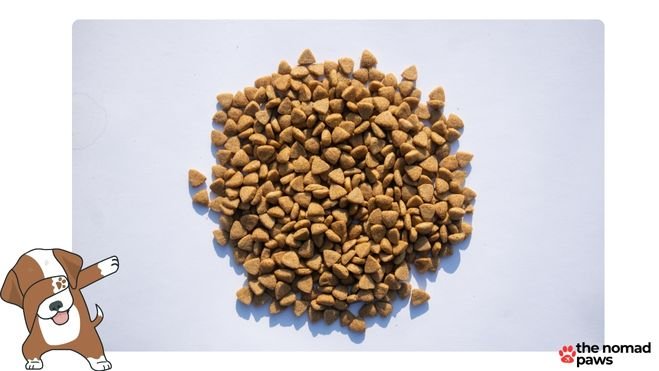
Kibble is perhaps the most common type of dog food, and for good reason. It’s convenient, has a long shelf life, and is generally more affordable than other options.
Pros
Cons
- Convenient and easy to store
- Helps maintain dental health by scraping plaque off teeth
- Usually complete and balanced nutrition
- Cost-effective
- Lower moisture content, which may not be ideal for French Bulldogs prone to dehydration
- Some brands may contain more fillers or lower quality ingredients
- May be less palatable for some dogs
For French Bulldogs, look for kibble that’s specifically designed for small breeds or brachycephalic dogs. These often have smaller kibble sizes that are easier for Frenchies to pick up and chew.
Wet Food

Wet food, which comes in cans or pouches, has a high moisture content and is often more palatable for dogs.
Pros
Cons
- High moisture content, which can help keep French Bulldogs hydrated
- Often more palatable, which can be good for picky eaters
- Usually contains fewer preservatives than dry food
- Easier to eat for dogs with dental issues
- More expensive than kibble
- Shorter shelf life once opened
- Doesn’t provide dental benefits like kibble does
- Can contribute to dental issues if it’s the only food given
Wet food can be an excellent option for French Bulldogs, especially those who need extra hydration or have trouble eating kibble. It can also be used as a topper for kibble to increase palatability.
Raw Diet
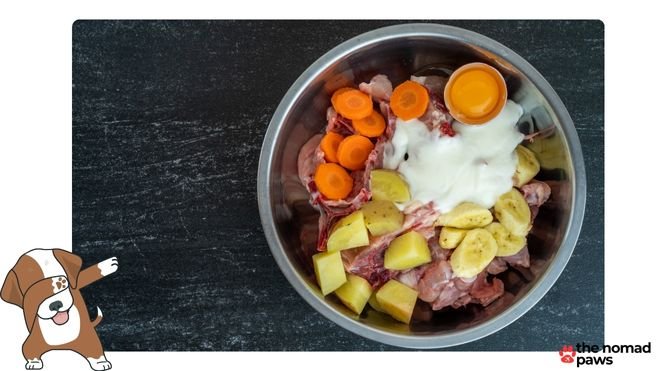
A raw diet typically consists of uncooked meat, bones, fruits, and vegetables. While controversial, some dog owners swear by the benefits of raw feeding.
Pros
Cons
- Can be highly digestible for some dogs
- May improve coat and skin health
- Can be beneficial for dogs with certain food allergies
- Allows for complete control over ingredients
- Risk of nutritional imbalances if not carefully planned
- Potential for bacterial contamination if not handled properly
- More time-consuming to prepare
- Can be expensive
- Potential choking hazard from bones
If you’re considering a raw diet for your French Bulldog, make sure you consult with a veterinary nutritionist first. This will help you to make sure the diet is complete and balanced.
Raw diets require careful planning and preparation to be safe and nutritionally adequate.
In many cases, a combination of these food types can provide the best of all worlds.
For example, you might use kibble as the main diet, with some wet food mixed in for extra moisture and palatability. Or you might use a high-quality kibble and add some raw components under veterinary guidance.
How Much Should a French Bulldog Eat?
As your French Bulldog progresses through different life stages, their nutritional needs evolve. It’s your duty to understand these changes to maintain your Frenchie’s health and vitality throughout their life.
Let’s explore how to adjust your French Bulldog’s diet as they age, ensuring they receive optimal nutrition at every stage.
French Bulldog puppies grow rapidly and require a diet high in calories and nutrients to support their development. Here are some key considerations to think about when you shop for food for your Frenchie as a puppy.
Smaller kibble size: French Bulldog puppies have small mouths, so choose a food with appropriately sized kibble.
Higher protein and fat content: Puppy food should have higher levels of protein and fat compared to adult dog food. Look for foods with 22-32% protein and 8-22% fat.
Calcium and phosphorus: These minerals are crucial for proper bone development. The calcium to phosphorus ratio should be about 1.2:1.
DHA: This omega-3 fatty acid supports brain and eye development.
Once your French Bulldog reaches adulthood, typically around 12 months of age, their nutritional requirements shift. Here’s what you need to keep in mind:
Protein and fat content should be moderated compared to puppy food. Look for foods with 18-26% protein and 12-16% fat.
This balance helps maintain lean muscle mass without contributing to excessive weight gain, a common issue in adult French Bulldogs.
Calorie control becomes crucial at this stage. Work with your veterinarian to determine the ideal calorie intake for your Frenchie based on their activity level and body condition.
Consider foods with added glucosamine and chondroitin for joint health. These supplements can help support your French Bulldog’s joints, which are often under strain due to their unique body structure.
As your French Bulldog enters their senior years, usually around 7-8 years old, their nutritional needs change once again. Here’s what to focus on:
Reduced calorie content is often necessary as senior dogs tend to be less active. However, protein levels should remain moderate to high to help maintain muscle mass. Look for senior-specific formulas that offer a balanced approach to nutrition.
Joint support becomes even more critical. Foods with increased levels of glucosamine, chondroitin, and omega-3 fatty acids can help manage arthritis and joint pain, common issues in older French Bulldogs.
Cognitive function support is also very important for senior dogs. Look for foods enriched with antioxidants like vitamin E and C, which can help support brain health in aging Frenchies.
Price vs. Quality: Finding the Best Food and Value
When it comes to feeding your French Bulldog, the old adage “you get what you pay for” often rings true. However, this doesn’t mean you need to break the bank to provide your Frenchie with high-quality nutrition.
Our Nutritionists Say: Don’t fall for the myth that expensive dog food is always better. Look for high-quality ingredients, not just a high price tag.
Some budget-friendly options can provide excellent nutrition for your French Bulldog.
Let’s explore how to navigate the balance between price and quality to find the best value for your French Bulldog’s food.
Budget-Friendly Options
While it’s true that many premium dog foods come with a hefty price tag, there are budget-friendly options that can still provide good nutrition for your French Bulldog. Here’s what to look for:
Focus on ingredients rather than brand names. Some lesser-known brands offer high-quality ingredients at more affordable prices.
Look for foods that list a high-quality protein source as the first ingredient and avoid those with excessive fillers or by-products.
Consider buying in bulk. Many pet stores and online retailers offer discounts for larger bags of dog food. Just be sure you can use the food before it expires to avoid waste.
Another great way to save money is to look for sales and subscribe-and-save options.
Many online retailers offer significant discounts if you set up regular deliveries of your dog’s food. This can lead to substantial savings over time.
Remember, the cheapest option isn’t always the most cost-effective in the long run. Feeding your French Bulldog a low-quality diet could lead to health issues down the line, potentially resulting in expensive veterinary bills.
Feeding Guidelines for French Bulldogs
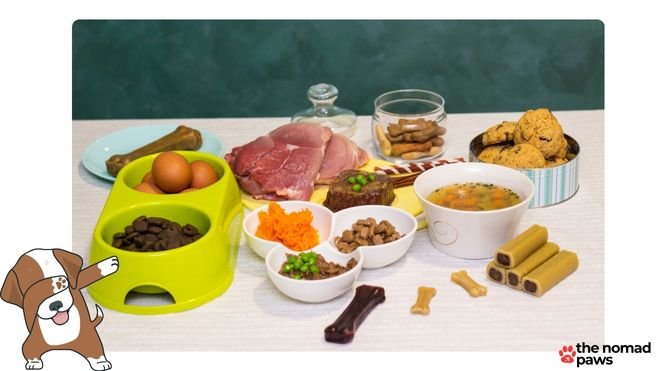
Establishing good habits and routines can help maintain your Frenchie’s health, prevent obesity, and ensure they’re getting the nutrition they need.
Portion Control
Like we’ve said earlier in this guide, French Bulldogs are notorious for their hearty appetites, but they’re also prone to obesity. This makes portion control absolutely crucial. Here’s how to approach it:
- Use measuring cups or a kitchen scale to ensure you’re feeding the correct amount. Don’t rely on eyeballing portions, as it’s easy to overestimate.
- Follow the feeding guidelines on your dog food package, but remember these are just starting points. Your French Bulldog’s individual needs may vary based on their age, activity level, and metabolism.
- Adjust portions based on your Frenchie’s body condition. You should be able to feel their ribs easily with a light touch, but not see them. If you’re unsure, consult your veterinarian for guidance on ideal body condition.
- Be mindful of treats. These should make up no more than 10% of your French Bulldog’s daily caloric intake. Consider using small pieces of their regular kibble as treats to avoid extra calories.
Vet’s Tip: Be mindful of your French Bulldog’s body condition and adjust their portions accordingly.
You should be able to feel their ribs easily with a light touch, but not see them.
Feeding Frequency
French Bulldogs do best with multiple small meals throughout the day rather than one or two large meals. This approach can help prevent bloat, a potentially dangerous condition common in brachycephalic breeds.
For adult French Bulldogs, aim for two to three meals per day. Puppies may need three to four meals daily to support their rapid growth and small stomachs.
Vet’s tip: Try to maintain consistent feeding times each day. This can help regulate your Frenchie’s digestive system and establish a routine.
If you’re using an automatic feeder, ensure it dispenses the correct portion sizes and at the right intervals. However, supervised feeding is often best for French Bulldogs to monitor their eating habits and prevent any potential choking hazards.
Feeding Schedule
Establishing a consistent feeding schedule can benefit both you and your French Bulldog. Here’s a sample schedule for an adult Frenchie:
- Morning (7-8 AM): First meal of the day, followed by a short walk or playtime to aid digestion.
- Midday (12-1 PM): A small meal or healthy snack, if feeding three times a day.
- Evening (6-7 PM): Last meal of the day, at least a few hours before bedtime to allow for digestion and a final potty break.
Remember to adjust this schedule based on your lifestyle and your French Bulldog’s needs. The key is consistency – try to stick to the same times each day.
For puppies, you might need to add an additional meal or two, spacing them evenly throughout the day. As your puppy grows, you can gradually transition to an adult feeding schedule.
Always provide fresh, clean water alongside meals and throughout the day. However, you may want to limit water intake immediately before and after meals to prevent bloat.
Common French Bulldog Food Allergies and Sensitivities

Food allergies in French Bulldogs can manifest in various ways, making them sometimes tricky to identify. Here are some common signs to watch for:
- Skin issues are often the first indication of a food allergy. Look for excessive itching, redness, or hot spots on the skin. Your Frenchie may also experience ear infections or paw licking and chewing.
- Gastrointestinal symptoms can include vomiting, diarrhea, or excessive gas. While these can be caused by various factors, persistent issues may point to a food allergy.
- Respiratory problems, while less common, can also indicate a food allergy. Watch for sneezing, coughing, or wheezing, especially after meals.
Our Nutritionists Say: If you suspect your French Bulldog has a food allergy, don’t try to diagnose it yourself.
Consult with your veterinarian, who can recommend allergy testing or an elimination diet to identify the specific allergen.
Hypoallergenic Food Options
Once you’ve identified that your French Bulldog has a food allergy, you’ll need to find a suitable hypoallergenic diet. Here are some options to consider:
Limited ingredient diets (LID) can help French Bulldogs with food allergies. These foods contain a minimal number of ingredients, making it easier to avoid potential allergens.
Novel protein sources, such as duck, venison, or kangaroo, can be helpful if your Frenchie is allergic to more common proteins like chicken or beef.
Grain-free options may be suitable if your French Bulldog has a grain allergy. However, it’s important to note that grain allergies are less common than protein allergies in dogs.
Hydrolyzed protein diets are another option. In these foods, the protein is broken down into such small pieces that the immune system doesn’t recognize it as an allergen.
Remember, transitioning to a new food should always be done gradually to avoid digestive upset. Mix increasing amounts of the new food with decreasing amounts of the old food over a period of 7-10 days.
Elimination Diets
An elimination diet is often the gold standard for identifying food allergies in dogs. Here’s how it typically works:
Your veterinarian will recommend a diet with a novel protein and carbohydrate source that your French Bulldog hasn’t been exposed to before.
You’ll feed this diet exclusively for 8-12 weeks, avoiding all other foods, treats, and even flavored medications during this time.
If your Frenchie’s symptoms improve, you’ll then “challenge” the diet by reintroducing potential allergens one at a time.
This process helps pinpoint exactly which ingredients are causing the allergic reaction, allowing you to avoid them in the future.
If you adopt this approach, to work closely with your veterinarian throughout this process to ensure your French Bulldog is still receiving balanced nutrition during the elimination diet.
Managing Flatulence Through Diet

French Bulldogs are notorious for their flatulence, which can be caused by various factors, including diet. Here are some tips to help manage flatulence in your Frenchie:
- Opt for easily digestible ingredients and avoid foods with excessive fillers or by-products.
- Consider feeding smaller, more frequent meals to prevent overeating and reduce the likelihood of gas buildup.
- If your Frenchie’s flatulence is persistent or accompanied by other digestive issues, consult with your veterinarian to rule out any underlying health conditions.
Transitioning to a New Food
When introducing a new food to your French Bulldog, do so gradually to avoid digestive upset. Here’s a step-by-step guide to transitioning your Frenchie to a new food:
- Start by mixing a small amount of the new food with your Frenchie’s current food. Use a ratio of 25% new food to 75% current food.
- Gradually increase the amount of new food while decreasing the amount of current food over a period of 7-10 days. Aim for a ratio of 50% new food to 50% current food after a few days, then 75% new food to 25% current food, and finally 100% new food.
- Observe your Frenchie for any signs of digestive upset, such as diarrhea or vomiting. If these symptoms occur, slow down the transition process and give your Frenchie’s digestive system more time to adjust.
- Monitor your Frenchie’s appetite, energy levels, and overall wellbeing during the transition. If you notice any significant changes or concerns, consult with your veterinarian.
Supplementing Your French Bulldog’s Diet
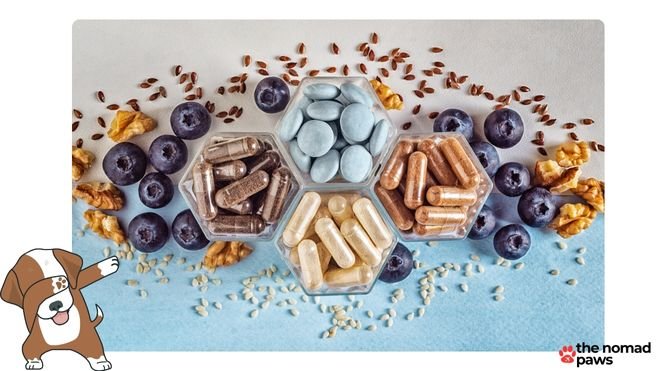
In addition to a balanced diet, some French Bulldogs may benefit from dietary supplements. Here are a few supplements that can support your Frenchie’s health:
Essential Vitamins and Minerals
Certain vitamins and minerals are essential for your French Bulldog’s overall health. These include vitamin D, vitamin E, vitamin C, calcium, and phosphorus.
While a balanced diet should provide these nutrients, your veterinarian may recommend supplements if your Frenchie has specific dietary restrictions or health concerns.
Omega Fatty Acids
Omega-3 and omega-6 fatty acids are important for your French Bulldog’s skin, coat, and overall health.
hese fatty acids have anti-inflammatory properties and can help reduce itching and inflammation in dogs with skin allergies.
Fish oil supplements are a common source of omega fatty acids for dogs.
Probiotics for Digestive Health
Probiotics are beneficial bacteria that can support a healthy gut microbiome. They can help improve digestion, reduce the likelihood of gas and bloating, and support overall digestive health.
Probiotics can be found in certain dog foods or as standalone supplements.



